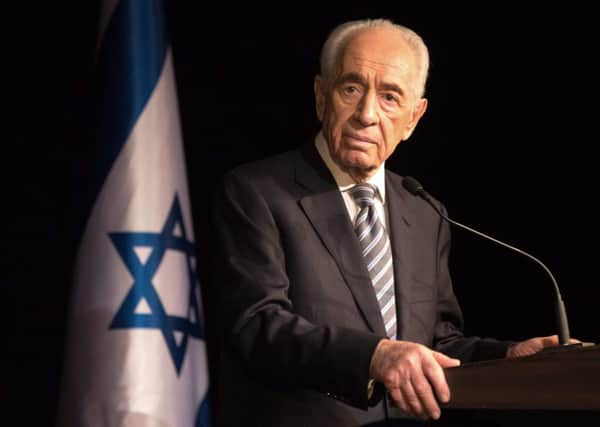Obituary: Shimon Peres, former president and prime minister of Israel who brokered the first Israeli-Palestinian peace accord


At every corner of Israel’s tumultuous history, Shimon Peres was there.
The Nobel Peace Prize laureate held every major office in Israel, including president and prime minister.
Advertisement
Hide AdAdvertisement
Hide AdHe was a young aide to the nation’s founding fathers when the country declared independence in 1948, and he played a key role in turning Israel into a military power. He was part of the negotiations that sealed the first Israeli-Palestinian peace accord, garnering a Nobel Peace Prize. He was welcomed like royalty in world capitals.
But only at the end of a political career stretching more than 60 years did Peres finally win the widespread admiration of his own people that had eluded him for so long.
Peres began a new chapter at age 83, assuming the nation’s presidency following a scandal that forced his predecessor to step down. The job cemented Peres’ transformation from down-and-dirty political operator or naive peace proponent to elder statesman and a wise, grandfatherly sage who transcended political divisions.
President Barack Obama led a US delegation to Jerusalem to attend Peres’ funeral yesterday – a fitting tribute for a politician who reveled in the political limelight and loved to hobnob with celebrities and the world’s rich and famous.
As president, Peres tirelessly jetted around the world to represent his country at conferences, ceremonies and international gatherings. He became Israel’s moderate face at a time when the nation was led by hard-line Prime Minister Benjamin Netanyahu.
Peres sought to reassure the international community that Israel seeks peace, despite concerns over continued settlement construction in the occupied West Bank and the paralysis of negotiations under Netanyahu.
It was his 1994 Nobel Prize that established his man-of-peace image. He displayed the prize – which he shared with Israeli Prime Minister Yitzhak Rabin and Palestinian leader Yasser Arafat – on the desk of his presidential office.
As foreign minister, Peres secretly brokered the historic Oslo interim peace accords with the Palestinians in 1993.
Advertisement
Hide AdAdvertisement
Hide AdAccepting the award, he told assembled dignitaries that “war, as a method of conducting human affairs, is in its death throes, and the time has come to bury it.”
Despite the assassination of Rabin, the breakdown of peace talks, a second Palestinian uprising in 2000, wars in Lebanon and Gaza, and Netanyahu’s continued re-elections, Peres maintained that peace was right around the corner. “I’m sure I shall see peace in my lifetime,” he said in an interview to mark his 90th birthday.
Peres was born Shimon Perski on 2 August 1923 in Vishniev, then part of Poland and now in Belarus. He moved to pre-state Palestine in 1934 with his family, where he changed his surname to Peres, or songbird, in Hebrew.
Relatives who remained in Poland, including his grandfather, a prominent rabbi, were killed when Nazis set a synagogue on fire during the Holocaust.
Still in his 20s, Peres rose quickly through the ranks of Israel’s pre-state leadership, and served as a top aide to David Ben-Gurion, Israel’s first prime minister, after independence in 1948.
At 29, he served as director of Israel’s Defense Ministry, and is credited with arming Israel’s military almost from scratch. He later worked with the French to develop Israel’s nuclear program, which today is widely believed to include a large arsenal of bombs.
In 1959, Peres was elected to the Knesset, Israel’s parliament, serving in nearly all major cabinet posts over his long career.
But he had trouble breaking into the prime minister’s post, the top job in Israeli politics. He was hampered by a reputation as both a utopian dreamer and a political schemer.
Advertisement
Hide AdAdvertisement
Hide AdHe ran for prime minister in five general elections, losing four and tying one, in 1984, when he shared the job in a rotation with his rival Yitzhak Shamir. He suffered another humiliation in 2000 when he ran for the presidency, a largely ceremonial position elected by the parliament. Peres believed he had wrapped up the election, but the Shas Party broke a promise to him and switched its support to Likud candidate Moshe Katsav.
Even so, he refused to quit. He was able to attain the presidency when Katsav was forced to step down to face rape charges.
Peres cultivated an image as a grandfatherly figure, frequently inviting groups of children and teens to the presidential residence. He embraced social media and promoted Israel’s high-tech industry.
Peres was a controversial figure among the Palestinians, who appreciated his peaceful rhetoric but also blamed him for a Israeli artillery strike that killed dozens of civilians in Lebanon in 1996 and for allowing continued settlement construction on occupied lands.
His wife Sonya died in 2011. He leaves a daughterand two sons. Peres represented “the essence of Israel itself,” President Barack Obama said. “A light has gone out, but the hope he gave us will burn forever.”